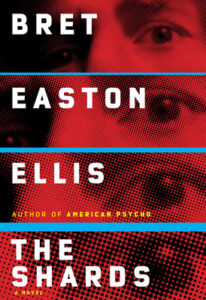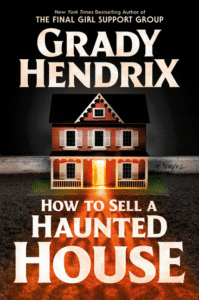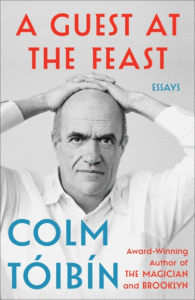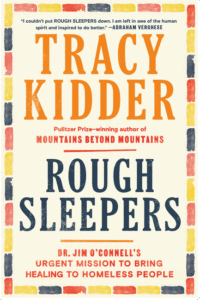
Bret Easton Ellis’ The Shards, Colm Tóibín’s A Guest at the Feast, and Grady Hendrix’s How to Sell a Haunted House all feature among the Best Reviewed Books of the Week.

1. The Shards by Bret Easton Ellis
(Knopf)
5 Rave • 7 Positive • 5 Mixed • 2 Pan
“A genuine literary event … Others before Ellis have attempted to retool the serial narrative for the internet age. Nothing has felt quite as thrilling as Ellis’s year-long, hour-by-hour performance of The Shards … Any lingering uncertainty that its brilliance lay more in the recitation than the writing can be dispensed with. The Shards isn’t just Ellis’s strongest novel since the 90s, it’s a full-spectrum triumph, incorporating and subverting everything he’s done before and giving us, if we follow the book’s ingenious, gleefully self-aware conceit, nothing less than the Ellis origin story … Superficially, The Shards cleaves to Ellis’s well-established aesthetic. The dialogue is deadpan, the atmosphere paranoid and tacitly hostile. Sex is graphic and anhedonic; violence is lurid and sexualised. But beneath the coldness and carnage, a new, gentler quality is detectable … We realise the precision and subtlety of its metatextual structure. The concluding violence is both climax and origination.”
–Sam Byers (The Guardian)

2. How to Sell a Haunted House by Grady Hendrix
(Berkley)
5 Rave • 2 Positive
“In this tale of ghostly happenings and creepy objects, the human drama at the core of it all is often even scarier than the supernatural … Trappings exist to remind you what kind of story you’re reading, and to create a certain atmosphere, but they’re also there so Hendrix can carefully, delicately, and thrillingly reinvent them to his own ends … Every time you think How to Sell a Haunted House can’t get more jaw-dropping, along comes the author with another reveal, another left turn that’s at once shocking and right at home within this narrative. It’s a pulse-pounding exercise in pure horror drive that never loses sight of its emotional core, and that makes it quintessential Hendrix.”
–Matthew Jackson (Paste)
3. The Sense of Wonder by Matthew Salesses
(Little Brown and Company)
5 Rave • 1 Positive
Read an excerpt from The Sense of Wonder here
“Insightful … Despite its precise analysis of the myriad manifestations of racism, this is a terrifically physical novel, as quick and compact as any NBA game … Salesses’s greatest risk is the way he draws the eclectic elements of this dynamic novel together. It’s not just a matter of interlocking plot points — we’ve seen that many times before. No, what Salesses does here is a remarkable feat of artistic prowess that somehow blends the themes of K-drama with the spectacle of sports drama in a way that resets our frame of reference for the Korean American experience. Indeed, it’s a move that doesn’t seem entirely possible until you see the jump yourself.”
–Ron Charles (The Washington Post)
**

1. A Guest at the Feast by Colm Tóibín
(Scribner)
7 Rave • 5 Positive
“Sumptous … This deceptively slim memoir expands out into something far greater than you might expect. In what amounts to not much more than a long magazine article, he creates a sweeping, lyrical portrait of the small-town idiosyncrasies, natural landscapes and family histories in southeast Ireland on which his novels have drawn for three decades … But fittingly, it’s precisely the details of that provincial world (the setting of so many of his novels) that Toibin conjures up superbly here.”
–Robert Collins (The Times)

2. Rough Sleepers: Dr. Jim O’Connell’s Urgent Mission to Bring Healing to Homeless People by Tracy Kidder
(Random House)
5 Rave • 3 Positive
“Tracy Kidder, a master of narrative nonfiction, is drawn to self-effacing, unsung heroes who work tirelessly to make the world a better place. Kidder delves deeply into his subjects, deftly weaving the fruits of his research into a strong narrative line that keeps readers turning pages. He doesn’t hide his admiration for his subjects … Rough Sleepers is yet another enlightening reminder from Kidder that we should, and can, do better.”
–Heller McAlpin (The Christian Science Monitor)
3. And Finally: Matters of Life and Death by Henry Marsh
(St. Martin’s)
5 Rave • 2 Postive
Read an essay by Henry Marsh here
“Marsh knows how to set a scene, how to create suspense and how to surprise the reader … For the most part, Marsh does not pretend to answer metaphysical questions about the mind, or even assume that they can be answered by the likes of us … Marsh is often funny, sometimes at his own expense … There’s no false comfort here. Instead, there’s prose that breaks in gentle waves, its undercurrents deep, the surface of an ocean vast enough to put our lives in moral perspective. The narrative takes detours through DIY and dollhouses, hospital décor and Himalayan hikes. Marsh is seated, storytelling, and he is in no hurry.”
–Kieran Setiya (The New York Times Book Review)

